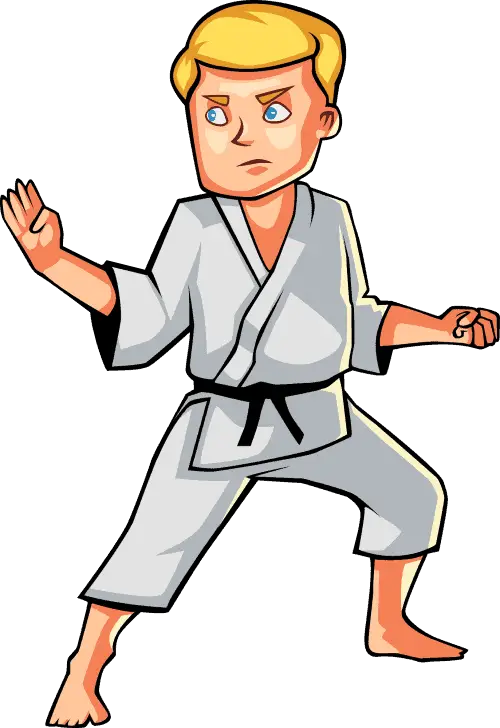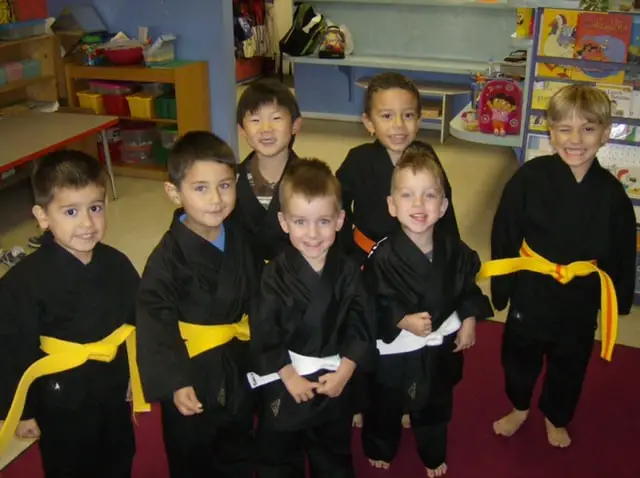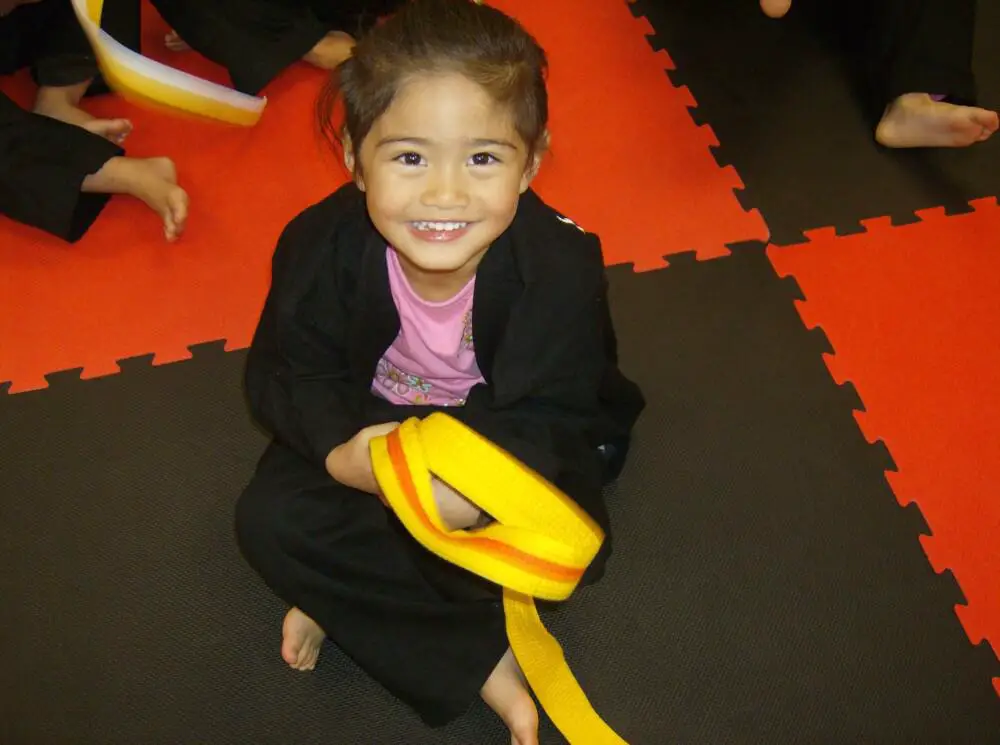
Martial arts have always been revered for their ability to instill skills that go well beyond just physical exercise. This has many people wondering whether or not martial arts can be used to boost the social skills of those who struggle with Aspergers?
Martial arts can boost the social skills of people with Aspergers because of its emphasis on discipline, respect, attention to detail, and teamwork. Though individuals develop at their own rate, exercises are done in groups, and individuals are encouraged to learn how to read their opponents.
If you or someone you love is looking to boost their social skills and get some exercise at the same time, you’ve come to the right place. Below, we’ll break down exactly what it is about martial arts that help develop a person beyond the purely physical.
Contents
- What Does Martial Arts Have to Do With Social Skills?
- 8 Social Skills that Can Be Improved Through Martial Arts
- Are There Martial Arts Classes Designed for People with Aspergers?
- What Other Benefits of Martial Arts Apply to Aspergers?
- So, Can Martial Arts Really Boost the Social Skills of People with Aspergers?
What Does Martial Arts Have to Do With Social Skills?
At first glance, you may wonder what exactly a physical sport like martial arts has to do with something like social skills. A closer examination, however, reveals that the development of social skills is one of the key benefits of martial arts.
Experts have noted that the routine structure of martial arts training seems almost designed for the predilections of individuals with Aspergers. This creates a safe, comfortable environment to push boundaries and learn new skills.
The social skills themselves are primarily developed by working with the class instructor and participating in group exercises, however simply learning discipline and how to stay on task also boosts these skills, as they are vital to having a real conversation and being able to listen to others.
8 Social Skills that Can Be Improved Through Martial Arts
So now that we know that martial arts can help boost an individual’s social skills–particularly when they have Aspergers–the question is which skills specifically will martial arts help and how? Below we breakdown eight different social skills that can be improved through martial arts.

Respect for Others
Martial arts is built on respect. Obviously, students have to have a degree of respect for their instructor in order to learn from them but they also have to have respect for each other, each on their own journey towards a black belt and beyond.
Turn Taking
This is particularly important for younger kids who have trouble waiting for their turn. During demonstrations, sparring sessions, and belt ceremonies, children learn to wait till it’s their turn and to cheer on their fellow classmates when it’s not. This is a great way to instill one of the simplest yet most important life skills parents often struggle to instill.
Learning How to Deal With Loss
Another social skill that many children with Aspergers struggle with is how exactly they should handle not always winning. In martial arts, there are several opportunities for children to learn that you win some and you lose some–particularly if they get involved in tournaments or enjoy sparring sessions.
The respect driven environment allows them to experience losing gracefully, without being teased or put down when it’s over the way they might be in a straightforward team sport.
How to Work Together
Though everyone learns at their own pace in a martial arts class, they don’t do it alone. From warm-up exercises to sparring sessions, students have to work together in groups.
Patience
This really goes hand in hand with teamwork. Once a student has been around for a while they are expected to help, in a sense, mentor newer students. This helps instill the patience they will need for social interactions throughout life.
Openness to Criticism
You don’t always get it right on your first go. In fact, you rarely do. For many people with Aspergers, this can be especially frustrating, however, when it’s not only happening to you but everyone else in the class, it’s a much easier lesson to learn.
Confidence

There’s no better feeling than knowing you succeeded at something that was really difficult. Students with Aspergers (and really anyone) can gain confidence by moving forward at their own rate in martial arts classes. This confidence translates into the way in which they present themselves to others and how easily they develop new social skills.
Focus and discipline
This is perhaps the most well-known skill that martial arts can instill in its students. Learning all of the moves that go into any individual martial art can only be accomplished through discipline and focus.
Uncomfortable social situations are the same way. Instead of interrupting or not being able to listen to everything someone is saying, kids learn how to put off gratification and learn something new.
Are There Martial Arts Classes Designed for People with Aspergers?
Throughout the United States, there actually are classes designed specifically for students who have Aspergers and other developmental challenges. You can learn more about our inclusive, online classes here, as well as our private online options here.
These martial arts groups move at a rate that is optimized for students with Aspergers. They also place more emphasis on movements and actions that target common challenges those with Aspergers face. Because we have a child with special needs including Autism, as well as over 20 years experience teaching special needs children in public and private schools, our classes are specialized for inclusivity.
If you have expertise in both Aspergers and martial arts yourself, you will recognize the importance of classes that are inclusive. You’ll more than also enjoy several guides and resources dedicated to adults and children with Aspergers . Consider this option from Amazon for adults and this one for “Asperkids”.
What Other Benefits of Martial Arts Apply to Aspergers?
Social skills are just one of many challenges people with Aspergers face. Fortunately, martial arts works on several other skills, including the following:
- Coordination: One thing that flows through the entire autism spectrum is that people often have difficulty developing motor skills and good coordination. On a physical level, developing good coordination is one of the primary goals of martial arts. These exercises can work wonders over time and instill in your child the fact that they can accomplish anything they want.
- Balance: Hand in hand with coordination is balance. Balance is key in every martial art from striking sports like taekwondo to grappling sports like jujitsu. This is great news to those with Aspergers as they often struggle with balance as much as coordination.
- Sensory overload: All throughout the autism spectrum individuals struggle with sensory issues. Martial arts helps individuals to distinguish what is most important to pay attention to and how to tune out other sensory inputs. This can be a game-changer when students with Aspergers go to school.
- Ability to handle stress: Most martial arts use breathing techniques to prepare students for the physical and mental strain exercises can put you through. This skill is fully transferable to other stressors in life. Aspergers can make it difficult to break out of old routines and deal with new situations or unexpected events. Learning to breathe through it and take things slower can make all the difference in the world.
So, Can Martial Arts Really Boost the Social Skills of People with Aspergers?
Martial arts can be of tremendous importance in helping individuals with Aspergers develop good social skills–particularly when they are young. This is so much the case that there are actually martial arts classes that are taught specifically for people with Aspergers and other developmental challenges.
In martial arts classes, discipline and respect are key, just as they are in social situations. These skills can help students learn to take turns, engage in teamwork, and do better in nearly every other aspect of life. If you’ve got a child with Aspergers, talk to them about enrolling in a martial art today!
For those with smaller children, my husband has a class that is taught with my teenage son right beside him, helping him in the class. He is on the Autism spectrum and has a learning disability. If you would like to have your Little Ninja join them Online right from your home, read this article to get all the details.
